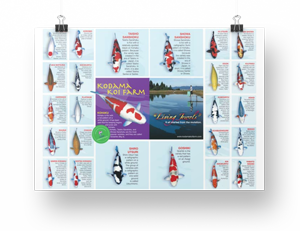How big is your pond? How many gallons? Are they shaded?
Understanding your pond environment may give us a clue to determining your kois health. Knowing the total gallons of water is also critical information when
deciding what dosage of medication to provide. If you do not know your total gallons of water, I strongly recommend measuring it now. You can use pond salt to measure the volume of your pond.
Did you do anything new lately? Add plants, new Koi, change water etc.?
Understanding a possible trigger of the problem can help us determine what happened and what we can do to fix it.
Do you have a separate aeration pump?
Koi can die due to a lack of oxygen. Some customers believe a waterfall is enough for oxygen, but, in my professional opinion, it is not. The more aeration, the better for your Koi, especially during summer time! Your entire population might die overnight because of lack of oxygen. From our experience, massive die-off can be caused by either lack of oxygen or high levels of chlorine. This happens when you forget to shut off city water when conducting a water change, which has high levels of chlorine.
What kind of filter do you use?
If your filter is not appropriate for your pond, it will not build an adequate nitrogen cycle. Without an established cycle, water quality will become poor, which can lead to sick
or, even worse, dead koi. Improving or upgrading your filtration system could minimize or altogether avoid this problem in the future.
Read more in our pond salt guide, pond oxygen guide, nitrogen cycle guide, how to feed koi guide, and sickness and disease guide


